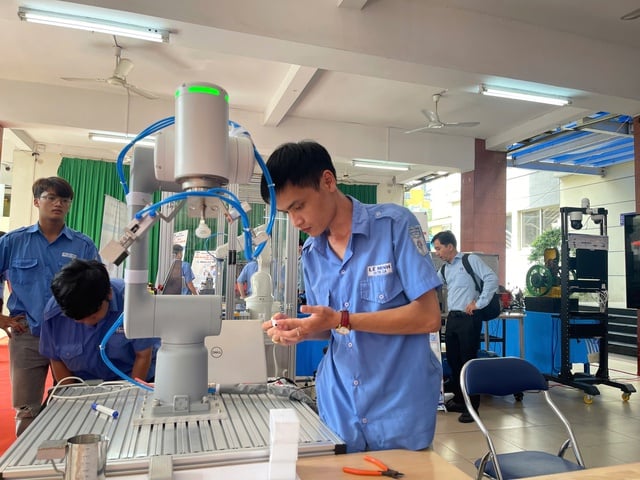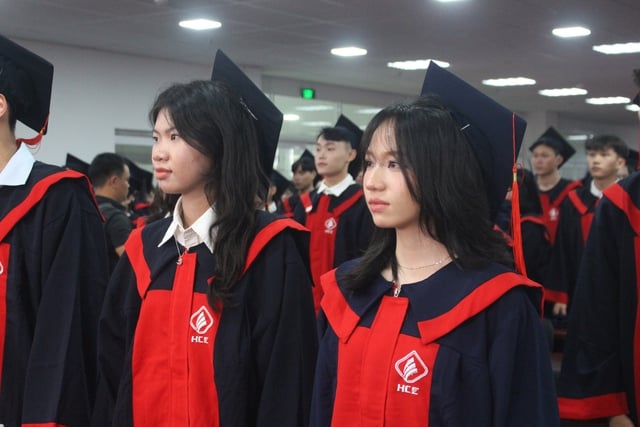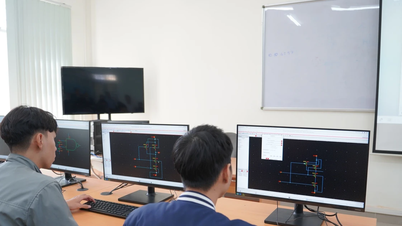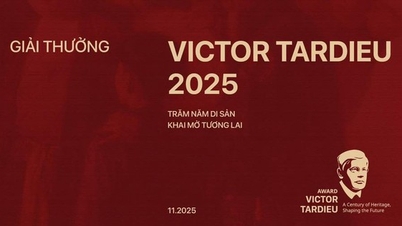The forum was organized by the Lao Dong Newspaper, within the framework of the program "Connecting human resources with employers" - Job Link 2025.
The labor problem and the challenge of "not rich yet old"
According to Mr. Pham Anh Thang, Deputy Chief of the Office of the Ministry of Home Affairs , Chief Representative of the Ministry of Home Affairs in Ho Chi Minh City, as of the end of the third quarter of this year, Vietnam had 53.4 million people of working age, the rate of workers with degrees and certificates reached 29.3%, an increase of 0.4 percentage points over the same period. However, the number of new entrants to the labor market is decreasing rapidly. If 15 years ago, each year there were 1.1 million people entering the market, now there are only about 500,000 people.
Mr. Thang warned that without a suitable human resource development strategy, Vietnam could fall into a situation of “not yet rich but already old”, when the workforce has not yet fully developed its skills before entering retirement age. “Currently, we do not lack workers, but we lack people with deep expertise. In particular, in the process of digital transformation, the public sector still lacks human resources good at information technology,” Mr. Thang said.
To solve this problem, Mr. Thang proposed a solution: enterprises (as employers) must set training goals, directly participate in the training process, each enterprise as a training facility; must link training in the right industry and profession that the unit needs, the labor market needs; order training facilities to "train correctly - train accurately", even invest in equipment and machinery to avoid wasting resources because in the past, most enterprises often had to retrain, which was very wasteful.

Enterprises cooperate with schools in training to avoid retraining, causing waste.
PHOTO: YEN THI
Ms. Luong Thi Toi, Deputy Director of the Department of Home Affairs of Ho Chi Minh City, acknowledged that in the period of 2025-2030, the Vietnamese labor market will develop in the direction of digital economy - automation - green transition - renewable energy - efficient logistics. This opens up many new job opportunities, but also places high demands on the expertise, skills and adaptability of workers.
In Ho Chi Minh City alone – a “super city” after the merger with nearly 14 million people, in the first 10 months of 2025, the city recorded 140,000 job seekers and 250,000 vacancies, a significant increase over the same period last year. However, the city is also facing the paradox of “surplus of unskilled labor, lack of high-quality labor”. This is a long-standing problem that requires solutions to promote human resource development.
Ms. Toi emphasized: "The city identifies human resource development as a central task, investing in people is the most profitable investment."

Enterprises can order training facilities to "train right - train accurately"
PHOTO: YEN THI
"There are jobs in every industry, 50/50 chance"
At the forum, Master Nguyen Thi Viet Tu said that while consulting on admissions, Master Tu often asked why students chose that major. Many students answered that they chose the major because their family oriented them, they had relatives working in that field, or their friends chose the same major... Some students even chose the school just because they saw that "the school has many beauty queens", "the rate of students having jobs after graduation is up to 98% and they are in the group with the highest salaries", but when asked "what major do you want to study", they answered "any major is fine".
Many students only discover after entering school that their major is not suitable, which greatly affects the quality of human resources that schools provide. When you study with passion, the love will be very different from when you study for someone, for some reason.
The question that parents and students often ask a lot: "What major should I study to get a job after graduation?"
According to Master Tu, this is a very simple question, every industry has jobs. When a training unit chooses to train in a certain industry, it must have social demand. Many schools advertise that "100% of graduates have jobs", but in reality, the opportunity given to students by family, school, and business is 50%, the remaining 50% depends on the student's efforts.
Solution to strengthen 3-party linkage
At the forum, experts agreed that to improve the quality of human resources, it is necessary to strengthen the connection between the State, schools and businesses.
Master Nguyen Thi Viet Tu frankly said that it is very difficult for training institutions to cooperate with businesses, not all businesses want to cooperate with schools in training. Therefore, Master Tu proposed that when granting operating licenses to businesses, there should be criteria on the level of contribution to human resource training. "In addition to profit, businesses need to have social responsibility - together with schools to train high-quality human resources for the country," Master Tu added.
Dr. Tran Dinh Ly, Vice Principal of Ho Chi Minh City University of Agriculture and Forestry, believes that schools and businesses cannot just "shake hands", but must "shake hands" tightly - together with real actions. Students should not ask "what job can I get", but ask "what can I contribute". Come to employers with the mindset of being in charge of your future.
Sharing the same perspective, Dr. Duong Ton Thai Duong, Deputy Head of Training Department of Ho Chi Minh City National University, said that human resource development today must be placed in a new context. Training cannot be separated from reality, but must be closely linked to the formation of skills, application capacity and continuous adaptability. Training objectives need to be built in the direction of "co-creation", meaning that schools, businesses and the State must participate from the beginning in the process of building programs, training and evaluating output, forming a training and employment ecosystem.
Ms. Tran Kim Trang, Sales Director of Good Jobs, said that recruitment trends are changing rapidly. "Companies no longer ask 'what qualifications do you have', but 'what can you do', 'how capable are you of learning new things', 'how adaptable are you to changes in work', Ms. Trang said.
Self-study skills and learning skills are very important, they are the survival skills of current workers. In addition, students need to cultivate communication skills, use and apply technology in work, foreign languages, etc., continue to maintain and build a professional working attitude, sense of responsibility, ability to adapt quickly, etc. to increase competitiveness in the labor market.
Source: https://thanhnien.vn/phu-huynh-hoc-sinh-hoi-hoc-nganh-gi-ra-truong-co-viec-lam-chuyen-gia-tra-loi-185251109155837243.htm

































































































![Dong Nai OCOP transition: [Part 2] Opening new distribution channel](https://vphoto.vietnam.vn/thumb/402x226/vietnam/resource/IMAGE/2025/11/09/1762655780766_4613-anh-1_20240803100041-nongnghiep-154608.jpeg)













Comment (0)